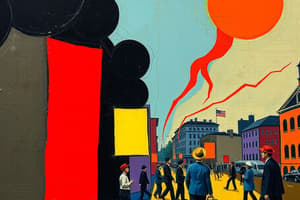Podcast
Questions and Answers
What best reflects Lizabeth's memory of childhood?
What best reflects Lizabeth's memory of childhood?
brown, dry, hot, and dusty
During what period of time in the history of the United States does this story take place?
During what period of time in the history of the United States does this story take place?
during the Great Depression
What is the 'cage' that Lizabeth refers to?
What is the 'cage' that Lizabeth refers to?
Poverty
Who is Joey?
Who is Joey?
What kind of work does Lizabeth's father do?
What kind of work does Lizabeth's father do?
What day stands out in Lizabeth's memory because it marked the end of her childhood?
What day stands out in Lizabeth's memory because it marked the end of her childhood?
What idea do Lizabeth, her brother, and their friends suggest and then reject for entertainment?
What idea do Lizabeth, her brother, and their friends suggest and then reject for entertainment?
Which of the following best describes Miss Lottie's house?
Which of the following best describes Miss Lottie's house?
Who is John Burke?
Who is John Burke?
What is John Burke doing when the children see him at Miss Lottie's house?
What is John Burke doing when the children see him at Miss Lottie's house?
What reason does Lizabeth give for why she and the other children hated Miss Lottie's marigolds?
What reason does Lizabeth give for why she and the other children hated Miss Lottie's marigolds?
What convinces Lizabeth to join the other children in throwing pebbles at Miss Lottie's marigolds?
What convinces Lizabeth to join the other children in throwing pebbles at Miss Lottie's marigolds?
What happens when the children throw pebbles into the cluster of marigolds?
What happens when the children throw pebbles into the cluster of marigolds?
What does Lizabeth call Miss Lottie when she runs up to taunt her?
What does Lizabeth call Miss Lottie when she runs up to taunt her?
What does Lizabeth hear when she wakes up in the middle of the night?
What does Lizabeth hear when she wakes up in the middle of the night?
What is upsetting Lizabeth's father?
What is upsetting Lizabeth's father?
What gift does Mr. Ellis, the man for whom Lizabeth's mother works, give to Lizabeth's father?
What gift does Mr. Ellis, the man for whom Lizabeth's mother works, give to Lizabeth's father?
What does Lizabeth's father do that confuses her and makes her feel her world is 'out of tune, like a broken accordion'?
What does Lizabeth's father do that confuses her and makes her feel her world is 'out of tune, like a broken accordion'?
What does Miss Lottie do when she confronts Lizabeth after the destruction of the marigolds?
What does Miss Lottie do when she confronts Lizabeth after the destruction of the marigolds?
At the end of the story, what does Lizabeth say marks the beginning of compassion?
At the end of the story, what does Lizabeth say marks the beginning of compassion?
Flashcards are hidden until you start studying
Study Notes
Childhood Memories
- Lizabeth's vivid recollection of childhood is characterized by being brown, dry, hot, and dusty.
- The story is set during the Great Depression, a time of significant economic hardship in the U.S.
Themes of Poverty
- Lizabeth speaks of a "cage" metaphor representing the entrapment felt by her and her community due to poverty.
- The sense of confinement and restrictions imposed by their socioeconomic status is a central theme.
Key Characters
- Lizabeth is the narrator, who reflects on the pivotal moments of her youth.
- Joey is identified as Lizabeth's younger brother.
- Lizabeth's father is depicted as unemployed, contributing to the family's struggles.
- Miss Lottie, a significant figure in the story, lives in a gray, rotting house and tends to her marigolds.
- John Burke is introduced as Miss Lottie's son, observed rocking in a chair during the children's encounter.
Important Events
- The story revolves around a memorable day marking the end of Lizabeth's childhood.
- Lizabeth and her peers initially consider hunting locusts for entertainment but dismiss the idea.
- Miss Lottie's marigolds are resented by the children for their beauty against a backdrop of desolation.
Conflict and Realization
- Lizabeth feels torn about throwing pebbles at the beautiful marigolds, deciding to join her friends to prove her bravery.
- The act of throwing pebbles results in the destruction of the marigold blossoms, symbolizing loss of innocence.
- Lizabeth’s confrontation with Miss Lottie leads her to call her an "old witch," indicating their contentious relationship.
Family Dynamics
- Lizabeth overhears her parents discussing their financial difficulties, specifically her father’s struggle to find work.
- Her father's unexpected tears during this conversation leave Lizabeth feeling that her world is chaotic and confusing.
Climax and Transformation
- After the incident with the marigolds, Lizabeth confronts Miss Lottie, who silently observes Lizabeth, emphasizing the gravity of the moment.
- The ending highlights Lizabeth's realization that true innocence cannot coexist with compassion, marking a significant moral awakening.
Studying That Suits You
Use AI to generate personalized quizzes and flashcards to suit your learning preferences.




